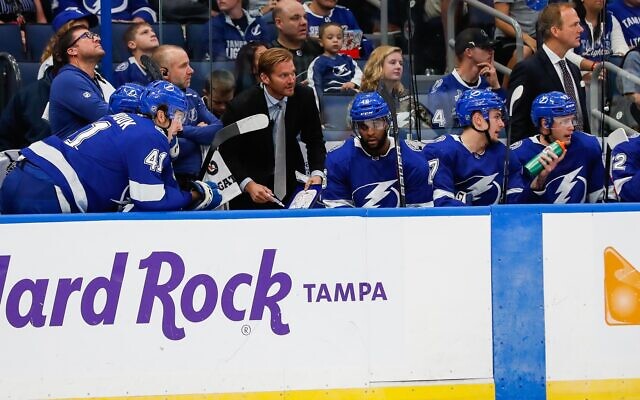Jeff Halpern Guides Tampa Bay to Victory
Halpern last year became only the second hockey player to be inducted into the Jewish Sports Heritage Association.

In his 14 years as a player in the NHL, Jeff Halpern never won a Stanley Cup.
Now, only four years into his tenure as an assistant coach for the Tampa Bay Lightning, Halpern, a native of Potomac, Md., and graduate of Princeton, has already won two Cup titles. With Tampa currently on pace to enter the NHL playoffs as a wild-card entry, a three-peat — something that hasn’t been accomplished since the New York Islanders’ dynasty did it during the 1980s — is a distinct possibility.
“We’ve talked about it [the 3-peat] for sure,” acknowledges the 46-year-old Halpern, who last year became only the second hockey player to be inducted into the Jewish Sports Heritage Association, “what it would mean for the guys in this room and for this organization and the fans and the city to be a part of something as special and unique as that.”
From hoisting the Cup in an empty arena to being away from loved ones for months on end, the Lightning’s run to back-to-back Stanley Cups during a global pandemic has, naturally, been unique.

“Personally, you want to go through those things with your family,” says Halpern, who in 2000 was inducted into the Greater Washington Jewish Sports Hall of Fame and, five years later, as a member of the Washington Capitals, made headlines by not playing on Yom Kippur. “Being apart from them was the hardest part. With that going on, you’re trying to support your players as well because they’re going through the same things. You’re trying to create an environment that they want to be in. I thought our organization did a great job of keeping things kind of fun and fresh and unique in that setting.”
From a professional standpoint, playing in the COVID bubble during summer 2020 was infinitely easier. There weren’t the seemingly interminable treks through western Canada or southern California that comprise the regular season schedule — something the Lightning, like all NHL teams, have had to become reacquainted with this winter.
“Because we were only playing against seven or eight teams, you’re familiar with the teams and with the cities travel-wise,” adds Halpern. “You didn’t have the monster road trips like you have this year. Preparing for the games was a lot easier, too. Many parts of it were easier.”
Even though he was a long-tenured NHL veteran, Halpern is now coaching in a very different league from the one he departed in 2014. NHL dressing rooms are now teeming with data-driven millennials and NHL coaches like Halpern often view themselves as lawyers with a clipboard and whistle.
“I think when you have an idea that you want to get through to the players, they are extremely smart, they are very well informed,” Halpern says. “Going back to when I played, we didn’t have access to the video and to all the information that these players have. So, if you’re telling a player to go left instead of right, the player, I’m sure, has an opinion on that. You have to present your case. You have to show him why you want him to go a certain way. There’s got to be data behind it. There’s got to be examples behind it. It can’t necessarily just be, ‘Do this.’
Players are informed and they want to know why. Like any good lawyer, you have to have good evidence behind you in order to sell your point.”
For the Tampa Bay Lightning organization, there is an abundance of evidence that Halpern is a perfect fit.



comments